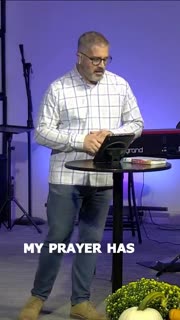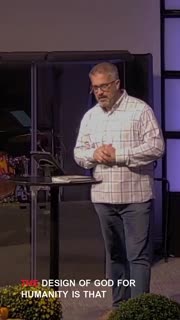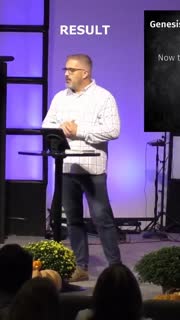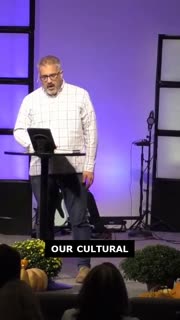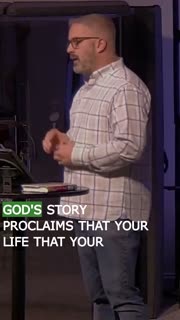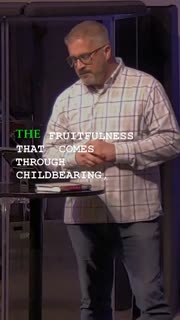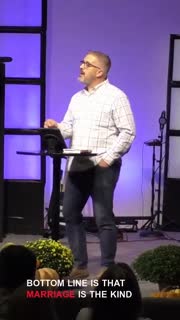Reflecting the Trinity: God's Design for Family
Devotional
Sermon Summary
Bible Study Guide
Sermon Clips
1. "My prayer has been, and it continues to be, that we will develop more confidence as we navigate some of the challenges that we are facing and, and as we come to better understand a concept and confidence of the body design that we are interacting with that God has made us as we interact within a culture of confusion around us." [39:23] (22 seconds)
2. "The design of God for humanity is that we were made for a unique, and suitable relationship with one another, with another humanity, which is a direct reflection of himself and who he is in the form and shape of the Trinity. The gift that God gives us in creation is an invitation, and it's twofold. It's an invitation to his image bearers to have full communion with him, right? If you don't understand what I mean by that, I'm talking about unhindered, uncomplicated, undistracted communion with God." [47:37] (36 seconds)
3. "The result of this moment in Genesis chapter three, the fall of man is a push into what we call autonomous solitude. That is the choosing to be alone or to be independent of the rules that define us and the freedom to govern ourselves, to be able to choose to do what I want to do, to choose to do what is right for me and for myself. This increasingly destroys the design, this, this ordered, designed of creation in communion by heaping shame on us and our bodies. And it is a disordered priority according to the design that God put in place." [50:37] (40 seconds)
4. "Our cultural vision today in many ways is still very much rooted inward on what is the best possible outcome for me, right? We are focused so much of our culture, so much of the world that we are living in this confusion today, so much of it is focused on the simple fact that I'm looking out for me. I'm looking out to help me and protect me. And at first, it may not even seem innocent or noble and even righteous, but in the long term, more often than not, it's a trajectory that has proven to be destructive and devastating." [56:54] (36 seconds)
5. "God's story proclaims that your life that your body belongs ultimately to God and he calls us to lay down our life for him to find what we truly seek and long for right the very difference here is very clear on a cultural perspective it's all about what i want and what i feel and what makes me feel like i'm living the life that i'm supposed to live god's ordered design that has its root in the creative order is a design that recognizes that even our bodies are gifts they are created works by our creator and we are not even in control of our own but we are responsible to our lord god in the way that we use and manage our bodies" [01:02:18] (47 seconds)
6. "The fruitfulness that comes through childbearing, I believe, ultimately is central to God's Trinitarian identity and creative plan. As God's Imago Dei people, we should be valuing and honoring the procreative work that we have been tasked with. Fruitfulness and reproducibility are clear design markers of God in his Imago Dei design, which ultimately makes it impossible to reflect in same-sex arrangements." [01:06:24] (28 seconds)
7. "The challenge of prioritizing fruitfulness is across the board a challenge for all of us that we need to be navigating today. And I'll say that this way, because this challenge is persisting in heterosexual relationships as much as it is in same-sex relationships, as we are now seeing a growing trend with millennials. And don't, if you're a millennial, don't get all hot with me, right? I'm only calling you out because you're in that childbearing age, right? Generally speaking, right? But we're seeing in that age group a moving away from marital fruitfulness. It's common to hear young couples say today that they're going to wait to have children until it better fits their lifestyle, if they're even going to have children at all." [01:07:55] (44 seconds)
8. "The bottom line is that marriage is the kind of commitment that we make that has a value and priority that we should be protecting and defending at all costs. And yet culturally, we sometimes find ourselves running fast away from it. Finally, the good of the unbreakable bond. That the marriage by design brings two people together into one flesh relationship, and it brings them together in an unbreakable bond. A bond that serves as a reflection, and witness of God's bond with us." [01:10:43] (33 seconds)
9. "If any of this is ever going to change, we as Imago Dei disciples need to be intentional and purposeful to step away from the autonomous solitude and selfish way of thinking and move toward a self-giving impulse. A giving impulse that gives freely of ourselves, not for ourselves, but for the sake of others. This self-giving impulse is at the heart of the design of the body, the biblical understanding of the body that God has given us." [01:16:10] (19 seconds)
10. "Parents, I invite you to have a conversation with your children about what an image bearer of God looks and acts like. Help them at a young age to begin to develop that understanding of the design that God's created in them. For those of you who are married, I want to applaud you. I've heard many of you went on date night this week, at least in some variation. I think everybody that came to me said, hey, pastor, we did date night. It looked like this, or it was kind of, we fit it in here. I'm like, look, I didn't tell you how to do it. I just had to do it. Kudos. Good job. But let's not stop there. Let's keep pressing in. So now this week, I want to challenge you. I want you to do something unexpected for your spouse. Something unexpected, that demonstrates your love and your commitment to them." [01:18:40] (42 seconds)
Ask a question about this sermon
2. "The design of God for humanity is that we were made for a unique, and suitable relationship with one another, with another humanity, which is a direct reflection of himself and who he is in the form and shape of the Trinity. The gift that God gives us in creation is an invitation, and it's twofold. It's an invitation to his image bearers to have full communion with him, right? If you don't understand what I mean by that, I'm talking about unhindered, uncomplicated, undistracted communion with God." [47:37] (36 seconds)
3. "The result of this moment in Genesis chapter three, the fall of man is a push into what we call autonomous solitude. That is the choosing to be alone or to be independent of the rules that define us and the freedom to govern ourselves, to be able to choose to do what I want to do, to choose to do what is right for me and for myself. This increasingly destroys the design, this, this ordered, designed of creation in communion by heaping shame on us and our bodies. And it is a disordered priority according to the design that God put in place." [50:37] (40 seconds)
4. "Our cultural vision today in many ways is still very much rooted inward on what is the best possible outcome for me, right? We are focused so much of our culture, so much of the world that we are living in this confusion today, so much of it is focused on the simple fact that I'm looking out for me. I'm looking out to help me and protect me. And at first, it may not even seem innocent or noble and even righteous, but in the long term, more often than not, it's a trajectory that has proven to be destructive and devastating." [56:54] (36 seconds)
5. "God's story proclaims that your life that your body belongs ultimately to God and he calls us to lay down our life for him to find what we truly seek and long for right the very difference here is very clear on a cultural perspective it's all about what i want and what i feel and what makes me feel like i'm living the life that i'm supposed to live god's ordered design that has its root in the creative order is a design that recognizes that even our bodies are gifts they are created works by our creator and we are not even in control of our own but we are responsible to our lord god in the way that we use and manage our bodies" [01:02:18] (47 seconds)
6. "The fruitfulness that comes through childbearing, I believe, ultimately is central to God's Trinitarian identity and creative plan. As God's Imago Dei people, we should be valuing and honoring the procreative work that we have been tasked with. Fruitfulness and reproducibility are clear design markers of God in his Imago Dei design, which ultimately makes it impossible to reflect in same-sex arrangements." [01:06:24] (28 seconds)
7. "The challenge of prioritizing fruitfulness is across the board a challenge for all of us that we need to be navigating today. And I'll say that this way, because this challenge is persisting in heterosexual relationships as much as it is in same-sex relationships, as we are now seeing a growing trend with millennials. And don't, if you're a millennial, don't get all hot with me, right? I'm only calling you out because you're in that childbearing age, right? Generally speaking, right? But we're seeing in that age group a moving away from marital fruitfulness. It's common to hear young couples say today that they're going to wait to have children until it better fits their lifestyle, if they're even going to have children at all." [01:07:55] (44 seconds)
8. "The bottom line is that marriage is the kind of commitment that we make that has a value and priority that we should be protecting and defending at all costs. And yet culturally, we sometimes find ourselves running fast away from it. Finally, the good of the unbreakable bond. That the marriage by design brings two people together into one flesh relationship, and it brings them together in an unbreakable bond. A bond that serves as a reflection, and witness of God's bond with us." [01:10:43] (33 seconds)
9. "If any of this is ever going to change, we as Imago Dei disciples need to be intentional and purposeful to step away from the autonomous solitude and selfish way of thinking and move toward a self-giving impulse. A giving impulse that gives freely of ourselves, not for ourselves, but for the sake of others. This self-giving impulse is at the heart of the design of the body, the biblical understanding of the body that God has given us." [01:16:10] (19 seconds)
10. "Parents, I invite you to have a conversation with your children about what an image bearer of God looks and acts like. Help them at a young age to begin to develop that understanding of the design that God's created in them. For those of you who are married, I want to applaud you. I've heard many of you went on date night this week, at least in some variation. I think everybody that came to me said, hey, pastor, we did date night. It looked like this, or it was kind of, we fit it in here. I'm like, look, I didn't tell you how to do it. I just had to do it. Kudos. Good job. But let's not stop there. Let's keep pressing in. So now this week, I want to challenge you. I want you to do something unexpected for your spouse. Something unexpected, that demonstrates your love and your commitment to them." [01:18:40] (42 seconds)
